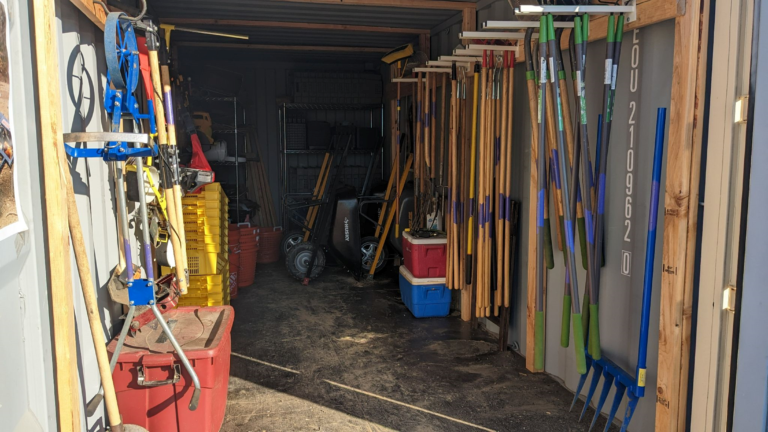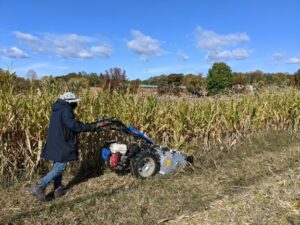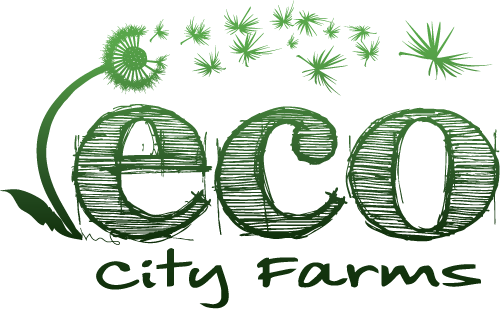WHAT THE Incubator Provides
The Urban Farm Incubator resources to support a variety of farm businesses. Here’s what farmers can expect at the site:
Temporary Land
½ acre plot, with initial prep for the season, such as sod breaking, plowing, etc. as desired. Use renewable for up to 5 years total on site
Basic infrastructure
High tunnels for growing and seed propagation, walk-in cooler, and a wash/pack area
Shared tool library
Selection of basic and specialized farm tools, geared towards intensive low-tillage farming methods (incl. BCS, broadforks, tilther, flame weeder)
Training/Workshops
A variety of topics to support both farming and business aspects. Most are optional; required trainings will cover food safety, safe equipment use, etc.
Technical Assistance
One-on-one attention to advise and connect you with agencies, experts and other resources to address challenges and opportunities
Utilities
Water, toilet facilities and limited electricity are provided on site. For 2024, there will be no charges for any utility use.
Marketing Assistance
Shared opportunities to market/sell products on site and through established partnerships
Land Access/ Transitioning Services
Help identifying available land, or other resources to further your farm business when transitioning out of the incubator site
FERTILITY
From onsite processing, some compost is available for each farm plot. Farmers will need to purchase additional soil amendments and other fertility inputs according to soil conditions and crop plans.
Bulk Buying Coordination
Staff can facilitate cost-efficient cooperative purchases of certain inputs and supplies.
Business Development Support
Help keeping track of crop planning, soil health, pest problems, harvest and sales, as well as income and expenses.


What the Farmer Commits to
We expect the following commitments from farmers at the incubator:
Active Use of Plot
Farmers will actively manage their plot, both crop and fallow areas, for the full period of their occupancy Failing to maintain active use of the plot and manage weeds can result in losing the site deposit and termination or non-renewal of use agreement.
Required Meetings
All farmers attend site-wide meetings 3 times a year as well as required workshops on food safety, equipment use, and regular check-ins with site staff and other farmers
Record-keeping and Plans
Records are required for nutrient management compliance, etc. A formal business plan is required by the end of the first season.
Shared spaces maintenance
Farmers contribute to the cleaning, repair, organization, and winterization of shared spaces and tools.
Commitment to Sustainable Growing Practices
All farmers are responsible for participating in the site-wide soil and water conservations plans and strategies. All growing practices must be consistent with Certified Naturally Grown and organic standards.
Evaluation Support
All farmers will be able to provide valuable feedback for evaluating and improving the incubator farm program.
Deposit for Site Use
A refundable deposit of $500 per plot is intended to cover the costs of potential damage, misuse, or abandonment of the plot. Much like a rental security deposit, it can be refunded at the end of the use agreement term.
Insurance
The site carries liability insurance for covered farming activities onsite. However, as part of the development of each farm business, liability insurance will eventually be required. In the meantime, certain insurance coverage may also be necessary for worker’s compensation or to conduct certain activities, such as selling through some farmer’s markets, etc.
Funds for business expenses
Each farm business must cover certain costs which vary depending on business model and scope. These include but aren’t necessarily limited to: seeds, transplants, most greenhouse supplies, row covers, irrigation supplies, product packaging and marketing materials, farmers market fees, business licensing/ permit fees, and transportation to/from site.
